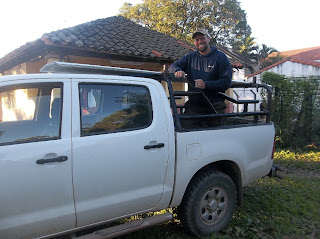We are
leaving Moro Moro soon. We know a lot of people here—hundreds, perhaps—and
all of them are exerting a lot of energy to send us off right. They beg us to make time in our schedules so
that they can make a lunch for us. They load
us up with bags and bags of corn, potatoes, eggs—whatever gift they can give to
express that they appreciate us or will miss us. They pull us aside to say things like, “We’ve
gotten used to having you around,” “Surely you can stay another year,” and “Who
will visit us after you leave?”
So we know
that we need to say goodbye, and we need to do it right. Many of these people have done an
extraordinary thing in accepting us—strange people—into their lives. Granted, they had to do so in order to
receive the services of our organization, but they didn’t have to do it so
graciously and with, as in many cases, so much genuine feeling. So we need to do this right—to say all the
right words with the right emotion, to eat more food than we feel like eating,
to drink more than we enjoy, to accept gifts that we can’t take with us
(“surely they’d let you take just these 25 kilos of potatoes on the plane,
right?). It’s hard, though. Sometimes we’re ashamed to realize that our
hearts are just not in it. We feel deep
appreciation for our friendships here, but that doesn’t change the fact that we
would gladly skip all the goodbyes if we could.
I suppose maybe that’s just the nature of goodbye. It’s no good.
Since our
attitudes are somewhat in the dumps, we’re thankful for those rare moments when
we find ourselves actually living in the moment rather than in the future. Sometimes the powerful mountain scenery we’ve
enjoyed for several years can still break through and amaze us, reminding us to
soak it in while we can. Sometimes, in
conversation with families who built water systems with us, someone will say
something like, “If it weren’t for you, I would be lugging that bucket up that
hill right now,” and we realize that this is not just something people say, but
rather a fact that demonstrates the importance of our work. And sometimes we are reminded that Moro Moro
culture is so distinct from our own, and we have to admit that we’ll actually
miss finding ourselves in hilarious situations on almost a daily basis. This was the case today.
Last year
we helped build a water system for 16 families in a community called Las
Lagunas. Most of the on-the-ground work
was done by a local mason and plumber, so we spent a lot less time in the
community than we had for other projects.
For this reason, we assumed a simple visit to say goodbye would be
sufficient. That was a silly thing to
think. Through a series of convoluted
channels, we received word that we would be expected at a lunch in Las Lagunas
today. We agreed, and we headed out this
morning. As we expected, there was lots
of delicious food, a bit of chicha, plenty of time to sit around and enjoy a
beautiful sunny day, lots of words of appreciation that made us feel a bit awkward.What
we didn’t expect was to arrive to the home where the lunch was held—a patio in
the middle of three small mud rooms with no electricity—and find a tower of
speakers taller than the tallest house in the area.
But no one
else seemed to think much of the enormous speakers, which belonged to the
host’s son, who makes money as a DJ in his spare time. We managed to ignore them all through lunch,
and we assumed there would be no music since there was no power source. But after lunch, just as we were trying to
start our goodbyes, the host’s son dragged a generator out of a back room and
started fiddling with it. An hour or two
later (after Andy finally got involved and fixed it) the generator fired up,
and the music started. It was extremely
loud. So loud that the sheep tied up on
the other side of the valley began running in circles on their ropes, trying to
get away from the noise. And yet, the
hosts seemed delighted to sit eight feet in front of the speakers.
We’ve come
to understand that on these occasions there are certain tasks required of
us—cultural hoops to jump through, you could say. If we don’t complete these tasks, the party
just goes on and on and everyone refuses to let us leave. We knew that, as soon as the music started,
one thing that was required was that Andy sit with the men for a while and
shoot the breeze. So that’s exactly what
he did. He sat himself down beside our
host, a few feet in front of the speakers, and they shouted to each other over
the din, telling jokes and discussing music preferences.
 |
Then we said
our final words of thanks (amplified through the speakers, of course), and our
host said a few nice words as well.
|
 |
Then we
tried to say goodbye again, and instead, Andy got invited to dance!
|








































